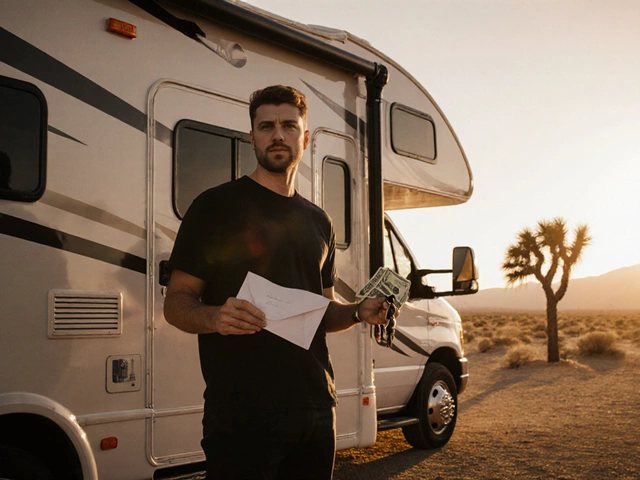Dreaming of hitting the open road in a motorhome, but unsure of the financial stepping stones to get there? You’re not alone. Securing a loan for that dream RV may seem daunting, especially if you're unsure about the credit score needed.
While some banks might have different criteria, there's a general range most lenders look for. It’s crucial to understand where you stand on this score and what factors can influence your application. Dive into the world of credit scores and arm yourself with knowledge that can turn the tide in your favor.
But there's more than just the number to consider—various elements go into ensuring a smooth approval process. We’ll unravel the mystery behind RV loan applications and provide you with practical tips to enhance your borrowing power.
- Understanding Credit Score Requirements
- Factors Influencing Loan Approval
- Tips for Improving Your Credit Score
- Alternative Financing Options
Understanding Credit Score Requirements
Grasping the ins and outs of RV loan credit score demands is crucial if you're thinking of taking that leap into motorhome ownership. While it may seem like a string of numbers at first glance, your credit score can either be the wind in your sails or the anchor holding you back. Generally, lenders look for a credit score of 650 or higher for traditional motorhome financing. However, don't be deterred if your score falls short. There are options on the table, and it's vital to know what these numerical thresholds entail.
The FICO score, predominantly used by lenders, ranges from 300 to 850. A score from 650 to 699 is often considered "fair," 700 to 749 is "good," and anything above is regarded as "excellent." Each bracket indicates the perceived risk level you present to the lender. This risk assessment directly impacts your loan's interest rates and terms. A higher score not only boosts your chances of approval but also contributes to more favorable conditions, saving you money in the long run.
For RV financing, it's beneficial to understand the distinction between secured and unsecured loans. A secured loan, often the case with RVs, uses the vehicle itself as collateral. In contrast, unsecured loans offer more flexibility but tend to require a higher credit score due to the increased risk to the lender. The interplay between score and loan type underscores why knowing your score and understanding these requirements is key. According to an article in the Financial Times, "Understanding the intricacies of your credit score can empower consumers to make informed decisions."
Your credit history is an influential factor that lenders review. It tells a story of your financial behavior, illustrating past debts, payment punctuality, and credit utilization. This narrative plays a part in your credit score and helps lenders anticipate potential default risks. For those with a lesser score, routine improvements like reducing credit card balances or ensuring timely payments can gradually tip the scales in your favor.
Some lenders are willing to extend RV loans to individuals with a score below the threshold, though often at higher interest rates. That's why understanding your lending institution's specific requirements and how they assess your credit profile is crucial before diving into negotiations. With awareness and preparation, you can position yourself for the best possible outcome regardless of where you start on the credit spectrum.

Factors Influencing Loan Approval
When it comes to securing an RV loan, several key factors can significantly impact a lender's decision beyond just the magic number of your credit score. While a high credit score can certainly open doors, it is not the sole determinant. Lenders often look at your entire financial picture to assess risk and your ability to repay the loan. Among these critical elements is your debt-to-income ratio, which helps lenders gauge your financial health. This ratio essentially compares your monthly debt payments to your monthly income, reflecting your ability to manage additional debt. A lower debt-to-income ratio suggests better financial health, which could work in your favor during the application process.
Another important factor is your payment history, which is a snapshot of your past dealings with credit. Lenders dig into this history to see how diligent you've been with repaying obligations. If you're someone who's missed payments or had loans go into default, this could raise red flags. Conversely, a clean, consistent payment history paints a picture of reliability and increases lender confidence in your ability to make timely RV loan payments. Also, the length of your credit history plays its role; a long and consistent borrowing record often works to your benefit.
Your recent credit activity also forms a crucial part of the lender’s assessment. If you've been opening multiple new credit lines in a short period, it might suggest financial instability or increased reliance on credit, which could adversely impact your application. This factor can sometimes be overlooked by borrowers but holds substantial weight in the eyes of lenders. Equally important is the type of credit accounts you hold. A mix of credit types, such as revolving accounts like credit cards and fixed accounts like auto or RV loans, demonstrates experience in handling diverse financial responsibilities.
Interestingly, the specific RV you intend to purchase can also influence loan approval. Lenders often account for the RV’s age, condition, and value, which helps them determine the loan amount and terms. Newer RVs usually carry less risk as collateral, potentially making lenders more lenient with loan conditions. In some cases, even the intended use of the RV—whether for full-time living or occasional vacations—can come into play. Keep in mind that lenders perceive full-time living in an RV as higher risk due to potential wear and tear.
According to a senior loan officer at a leading bank, "Assessing an RV loan request is not just about the credit score; it's a complete financial portrait that includes income, existing debts, and even the condition and use of the RV."These words encapsulate the multi-faceted nature of loan approval. By understanding these variables, you can better prepare your application and anticipate what lenders prioritize. For those aspiring to secure an RV loan, attention to these factors not only aids in avoiding surprises but also empowers you to address potential weaknesses in your financial profile before approaching lenders.

Tips for Improving Your Credit Score
Enhancing your credit score might seem like a monumental task, but with the right approach, it's completely achievable. Understanding what impacts your score is the first step toward improvement. A credit score is determined by several key factors: payment history, amounts owed, length of credit history, new credit, and types of credit used. To make a positive change, begin by focusing on your payment history, which accounts for a substantial portion of your score. Consistently making payments on time can significantly benefit you over time. Setting up automatic payments or calendar reminders might help keep you on track and ensure no payments are missed.
Another effective strategy is to check your credit report regularly for inaccuracies. It's not uncommon to find errors that could negatively impact your score. If you find any inaccuracies, contacting the credit bureau to dispute them should be a priority. Keeping an eye on your report doesn't just allow you to correct mistakes; it also helps you understand patterns, such as when your score tends to dip and why.
According to a 2022 report by the Consumer Financial Protection Bureau, one in five people have an error on at least one of their credit reports.Correcting these mistakes can be a quick and efficient way to boost your score.
Paying down outstanding debts is another crucial factor. High credit utilization can drag down your score, so try to keep your credit card balances below 30% of your credit limit. This shows lenders that you use your credit wisely and don’t rely too heavily on available credit. Creating a budget can help manage your spending, ensuring that a substantial part of your income is directed toward reducing your debts. Remember, the lower your balances in relation to the limits, the better your score will be.
If you're just starting to build credit, or if your credit history is relatively short, consider opening new credit accounts responsibly and only as needed. Each new credit application results in a hard inquiry, which can momentarily decrease your score. Therefore, space out your applications and choose your accounts wisely. Adding different types of credit to your profile, like a mix of revolving (credit cards) and installment credit (loans), can also positively influence your score, reflecting your ability to manage diverse credit lines responsibly.
One strategy that’s often overlooked is becoming an authorized user on someone else’s account, preferably one with excellent credit. Their good payment history and low credit utilization can reflect positively on you, providing a boost without the need for a new credit application. However, this comes with its own set of responsibilities, as the primary account holder's financial missteps can also affect your score. This technique works best within trusted relationships, where financial synchronization is maintained.
Improving your credit score is a marathon, not a sprint. It requires patience, discipline, and a structured approach to managing finances and debt. The rewards, though, are immense, opening doors not only to securing an RV loan but also better terms on a variety of credit products. Take these steps today, and you'll be on the path to not just buying your dream motorhome, but also achieving long-term financial health.

Alternative Financing Options
When the quest for an RV loan credit score doesn't meet traditional lenders' requirements, fear not—there are alternative avenues to explore. Understanding these options can make a tremendous difference in your motorhome purchasing journey. You might discover that unconventional means offer flexibility and terms more aligned with your needs. Unlike conventional bank loans, alternative financing options often have lenient credit score prerequisites, which can be a beacon of hope for those with less-than-perfect credit histories. Let's dive into these possibilities, dispelling myths and clarifying realities along the way.
One notable option is peer-to-peer lending, which connects borrowers directly with individual lenders through online platforms. This method cuts out the traditional banking middleman, potentially leading to competitive rates and unique loan structures. Peer-to-peer lending opens doors for those usually sidelined by conventional means. It embraces a system where trust among individuals can transcend typical credit score limitations. However, buyers should be cautious, as these loans can carry higher interest if not diligently compared and chosen wisely. Still, the opportunity to negotiate terms that fit personal financial situations makes it an alluring path.
Motorhome financing can also pursue avenues such as personal loans from credit unions. Unlike standard banks, credit unions often serve smaller communities and prioritize member service over profit. They are also traditionally more willing to consider an applicant’s story rather than adhering strictly to credit scores. This person-centric approach can lead to lower interest rates and a more forgiving application process. It's an ideal match if you value a relationship with your lender and believe your financial history deserves personalized evaluation.
According to a study by the National Credit Union Administration, credit unions in the United States often offer interest rates that are up to 1% lower than those provided by traditional banks on a variety of loans.For those embarking on a motorhome financing adventure, niche lenders specializing in RVs remain a viable option. These lenders understand the unique nature of recreational vehicle purchases and may provide loans tailored to the seasonal income variations of many RV enthusiasts. Such lenders have a seasoned insight into the RV market, allowing them to offer bespoke financial products that cover new or used motorhomes, as well as refinancing deals.
Don’t shy away from manufacturer financing programs either. Many RV manufacturers have developed tailored financing solutions with terms that accommodate their products specifically. Sometimes, they offer enticing incentives like deferred payments or low introductory rates to sweeten the deal. Researching offers directly from RV brands could be strategically beneficial if an existing relationship or brand loyalty is present, which can sometimes influence the deal positively.
Relying on savings accounts or setting up a joint loan with a trusted cosigner are also options worth considering. In the case of a cosigner, the strength of their financial profile can enhance both the approval odds and the terms of your loan, providing significant leverage. Remember, securing a cosigner is not just a formality but a binding financial partnership.
Alternative financing isn't just a last resort but a spectrum of viable options, catering to diverse financial backgrounds and aspirations. The key is thorough research and careful scrutiny of the terms involved. Always aim to strike a balance between meeting the lender’s requirements and securing a deal that aligns with thriving in your motorhome lifestyle.






